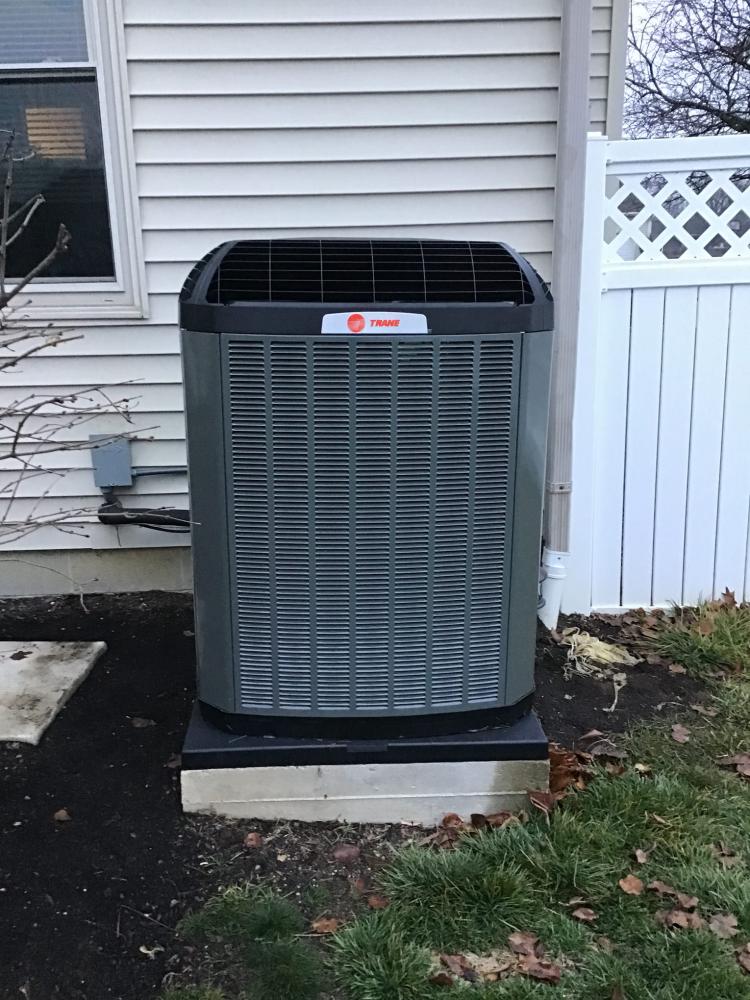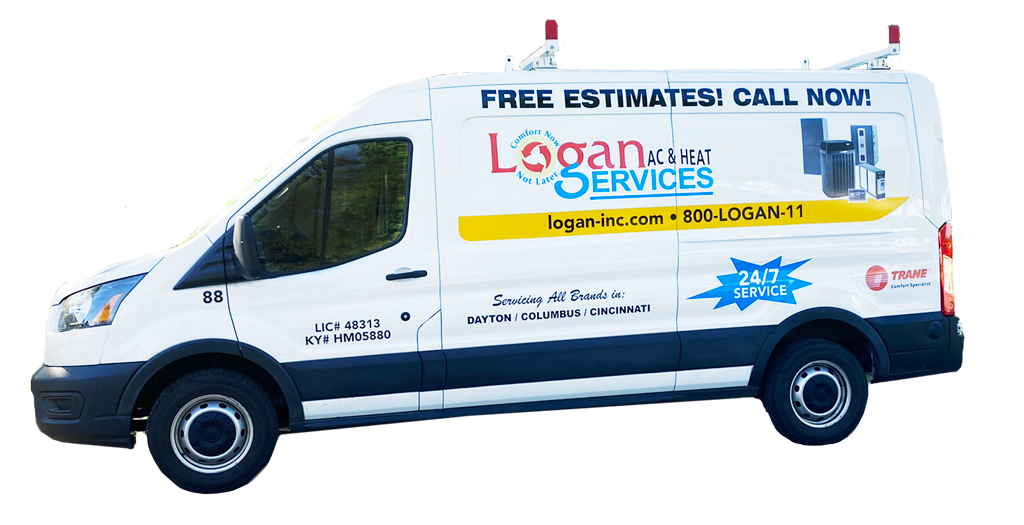When it comes to enjoying home comfort in the summer, there’s no greater factor than choosing the best air conditioner for your space. Did you know that there are multiple options for air conditioning in your home?
Read on to learn more about 9 different home air conditioners and how you can ensure that you choose the best AC system for your home.
1. Window Air Conditioners
Window air conditioners are often used to supplement cooling in one room that needs an additional boost or as an entire home cooling solution when you do not have ductwork. While it’s not uncommon to spot a window AC in your neighborhood, the cons often outweigh the pros regarding comfort and cost-effective operation.
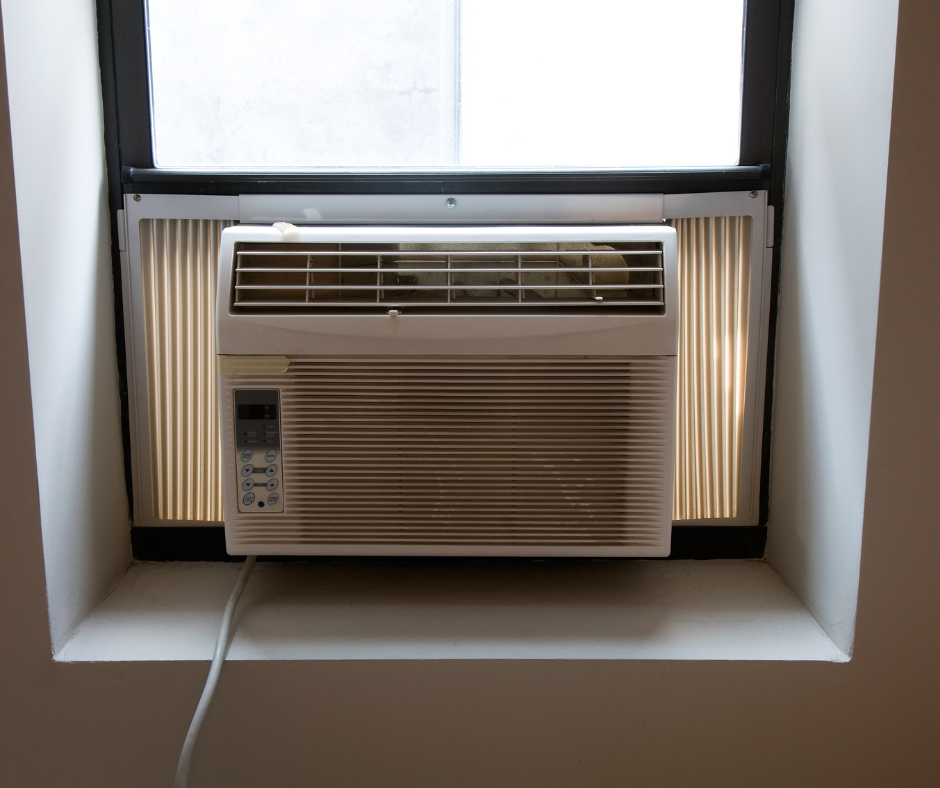
Advantages
- Generally simple to install as a temporary space cooling system.
- Do not require a licensed contractor to set up.
- Readily available to purchase at home improvement stores.
- Can be a cost-effective purchase.
- No ductwork needed.
Disadvantages
- Noisy and not aesthetically pleasing.
- Can be expensive to operate.
- Only provides cooling to a single room/space.
- Hassle of removing and storing the unit, especially a large window air conditioner, after the summer is over.
- Wholesale prices when purchasing from retail store.
2. Central Air Conditioner
Traditional central air conditioning equipment is an excellent total home comfort solution. Since the 1970s, this system has become a standard. Central AC refers to an HVAC system with one central source of cooling distributed to each area of the house by fans and ductwork. These cooling systems consist of an outdoor AC unit that pairs with an evaporator coil that sits on your furnace to absorb the heat from the air in your house. Central air conditioning systems are popular HVAC applications in the Ohio region and offer effective residential cooling.
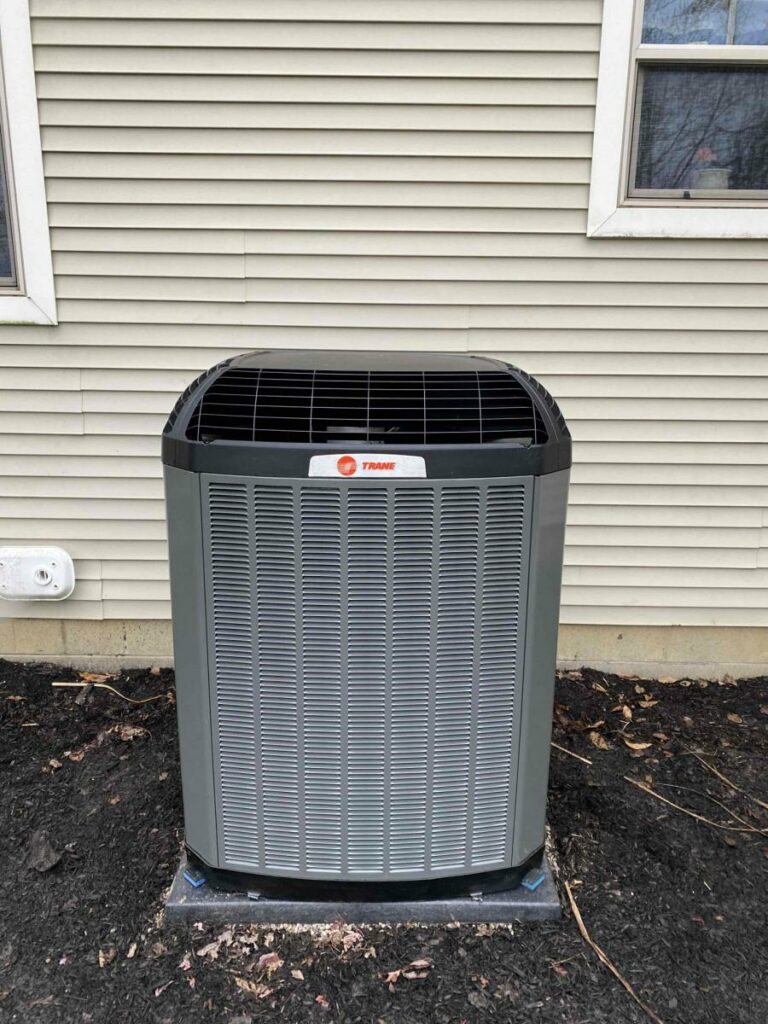
Advantages
- Conditioned air is dispersed throughout the entire home through vents.
- Provides energy efficiency and cost-effective cooling solution.
- Central air conditioners are a common application, so replacement/repair parts are readily available.
- Many companies service these units.
- When installed, your new central air unit should come with a warranty of approximately 10 years.
- Most systems operate with a WIFI thermostat, and in many cases, through an app on your mobile device.
- Some HVAC installation companies, like Logan Services, offer financing options to make a new central AC system an affordable purchase.
Disadvantages
- Poor ductwork can result in a loss of conditioned air.
- Unit sits outside, so it is exposed to outdoor elements.
- High-efficiency systems have grown in equipment size, making them more noticeable in your landscape.
- You will require a licensed contractor to purchase and install the central AC.
3. Ductless Mini-Split
Ductless mini-splits are growing in popularity in the United States. These heat pump systems operate to cool or heat by zone(s), require no ductwork and are one of the most efficient ways to cool your home. While they can be used as a whole-home solution, split systems are most commonly utilized as supplemental cooling for a room or area that is hard to keep conditioned. Mini-split cooling systems are great for a sunroom, living space with vaulted ceilings, room addition, or the top level of a 2-story home.
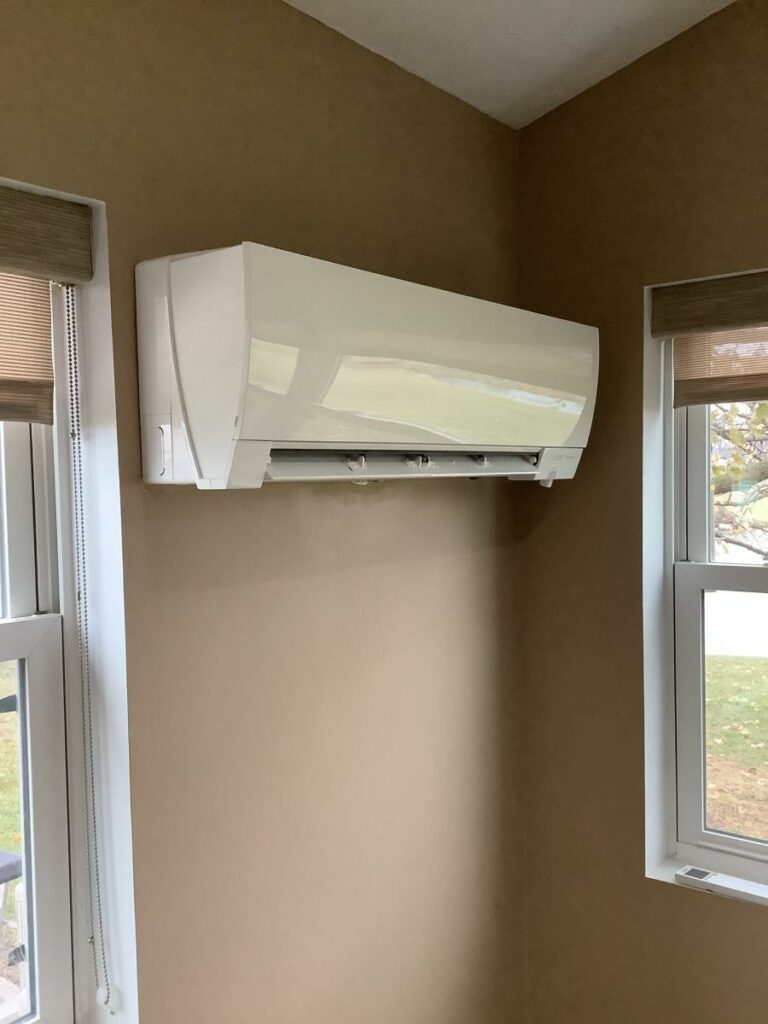
Advantages
- Requires no ductwork, so walls don’t have to be opened to allow a duct run.
- Effective and highly efficient solution.
- Whisper quiet operation.
- Standalone application – does not require being tied into existing ductwork.
- You can control the system with a remote control, and in many cases, through an app on your mobile device.
Disadvantages
- Upfront cost to purchase the equipment/installation.
- Some homeowners don’t like the look of the wall-mounted indoor head and the outdoor line set to connect the indoor and outdoor equipment.
4. Portable Air Conditioner
A portable air conditioner is a cooling system that is a standalone piece of equipment; the portable unit sits indoors and provides conditioned air to that space or room. To properly exhaust warm air, a portable air conditioner must be vented outside your home, usually through a window.
Advantages
- Can be cost-effective to purchase at your local home improvement store.
- Does not require a contractor to set up.
- No ductwork required.
- It can be relocated to another room or home in the future.
Disadvantages
- Most units are only built to cool one space.
- Unit and vent takes up floor space in your home.
- Hassle of storing the system when not in use.
- Wholesale prices when purchasing from retail store.
5. Floor Mounted Air Conditioner
Not overly popular in our region as a residential cooling application, floor mounted cooling systems are installed on the wall near the floor. You have most likely experienced a system like this in a hotel room.
Advantages
- Effective solution for single living space, such as a hotel room.
- No ductwork required.
Disadvantages
- Loud operation.
- Turns on/off frequently.
- Only provides conditioned air to one space.
6. Smart Air Conditioner
A smart air conditioner can be any combination of these cooling systems addressed in this list. Whether a portable, window, or central air conditioner, a smart AC system will have added features, such as more effective cooling, quiet operation, and the ability to utilize voice commands through Alexa and Google.
Advantages
- More quiet operation.
- Voice commands.
- Energy efficiency features which result in savings on your utility bills.
- Ability to control your HVAC system from a mobile app.
Disadvantages
- Typically more expensive to purchase upfront.
- Could require a learning curve to understand smart controls.
7. Geothermal Air Conditioning System
Geothermal air conditioning uses the Earth’s regulated temperature by using a ground-source heat pump to condition your home. This cooling and heating system is a more popular consideration for those looking to build a home, as it is expensive and intrusive to your property.
Advantages
- Very efficient operation.
- Incentivizing tax credits sometimes available for new geothermal installation.
Disadvantages
- Significantly more expensive to purchase than central AC.
- To install, you will require pipes to be buried under your home, which will tear up your yard.
8. Hybrid / Dual Fuel Air Conditioner
Dual fuel air conditioning units are electric heat pumps which are paired with a gas-fueled furnace. Heat pumps act like air conditioners in the summertime, providing cooling to your home; when the temperatures drop, the heat pump can effectively supply heat to your home down to 30-35 degrees outside. Once the outdoor temperature drops below 30 degrees, your natural gas or propane furnace triggers to heat your indoor air. A heat pump and an air conditioner can look identical externally; the main difference will be that a heat pump will sit up off the ground, usually on plastic ‘feet,’ to allow air to circulate under the system.
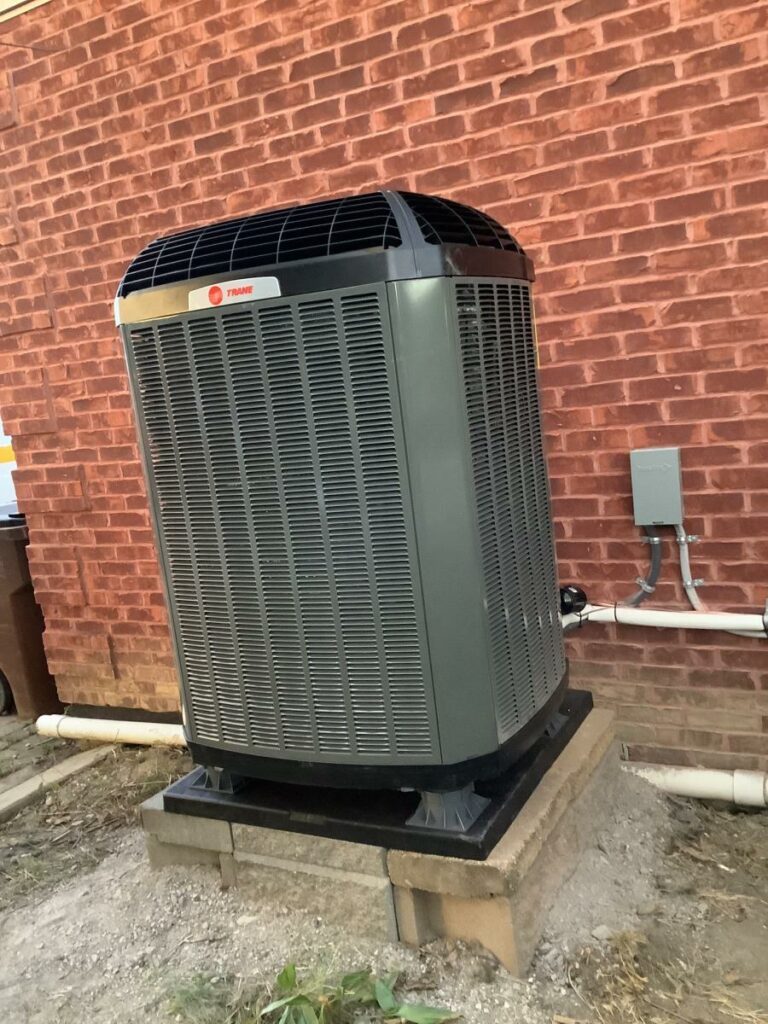
Advantages
- Efficient cooling and heating.
- Helps to keep your gas/LP usage down in the winter.
- Can save you money on utility bills.
- You can adjust temperature threshold settings when gas prices fluctuate.
Disadvantages
- Heat pumps often have a shorter life span than a traditional air conditioner because they can operate year-round.
- Electric heat is a ‘cooler heat’ than gas-fueled heat, so heat from your heat pump may not feel as warm.
9. Cassette Air Conditioner
A cassette air conditioner is a cooling system typically installed into the ceiling. More commonly utilized in residential apartments, office spaces, and other commercial settings, a cassette air conditioner can provide effective cooling because the cool air will sink to the bottom of the room, which distributes the air to condition your space evenly.
Advantages
- Since cold air falls, cassette air conditioner systems can provide effective cooling.
- Because they are ceiling-mounted, the system is not an obstruction.
- Generally quiet because the condenser is located outside.
Disadvantages
- Expensive to install.
- Difficult set up because it requires ductwork that may not already be in place.
How Can You Choose the Right Type of Air Conditioning System?
To make the best choice for your home air conditioner replacement, use these factors as guidelines:
- Efficiency : When it comes to AC replacement, energy efficiency should be on the top of your list as a key factor in your decision. Do yourself a favor and opt for more efficient HVAC equipment to save money and energy in the future.
- Capacity : Determine which application will fit your space best. Consider a central air conditioner or heat pump system for a whole-home solution. For single-room applications, ductless mini-split systems are a great solution.
- Maintenance : Understand that after your AC equipment has been set up, it may require maintenance to keep it running properly. Do your research to determine what routine tasks you should perform to help aid the operation of your AC system.
- Price : The price of a new air conditioning system will likely be the first thing you start with when comparing your options. Be mindful that some applications with a higher upfront cost, like energy efficiency central AC installation, should save you money in the long run. When choosing between HVAC contractors, you often ‘get what you pay for,’ so partner with a company that offers excellent products and quality installation at a fair and affordable price.
Choose Logan AC & Heat Services
If you’re looking for quality service from a reputable HVAC company, choose Logan Services. We’ve served Ohio residents since 1969 with outstanding customer service and a commitment to quality. If you’re looking to invest in a new AC system, we can assess your space and make the best recommendation for your situation so you get the most value from your system. Contact us today to get started.
FAQs
What is the most reliable air conditioning unit?
Central air conditioning systems are a popular residential application. When comparing HVAC brands, Trane consistently makes the top of the list, year after year. Known for their reliability and durability, Trane air conditioners are a favorite amongst consumers.
Which AC is best for bedrooms?
If you are looking for supplemental cooling for your bedroom, a Mitsubishi mini split system is an excellent solution to consider. A mini split heat requires no ductwork and can be installed on your bedroom wall to supply quiet and efficient cooling to your living space.


